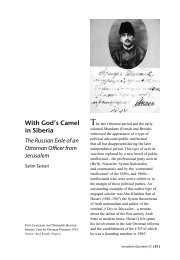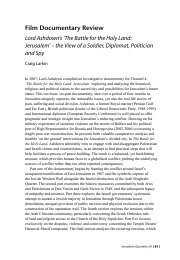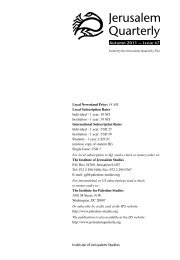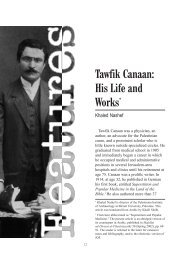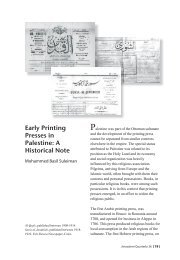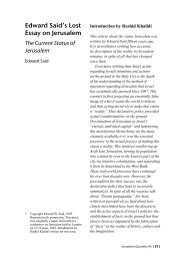PLUNDERING PALESTINE - Jerusalem Quarterly
PLUNDERING PALESTINE - Jerusalem Quarterly
PLUNDERING PALESTINE - Jerusalem Quarterly
You also want an ePaper? Increase the reach of your titles
YUMPU automatically turns print PDFs into web optimized ePapers that Google loves.
The excavation had uncovered what appears to be a small bathhouse from the late<br />
Roman period, 300-400 A.D. The archaeologist believed that the bathhouse was<br />
connected to an army unit due to its small size. He did not exclude, however, the<br />
possibility of the existence of a nearby village, making this the bath of a private<br />
house. The bathhouse included three rooms: hot, warm and cold. The excavation had<br />
uncovered mosaic pieces in the bath area, but not complete mosaic floors.<br />
The excavation had also uncovered an olive press from a later date, probably from the<br />
Byzantine or early Islamic period. The excavators believe that, during this time, the<br />
crushing of olives was carried out in the bathhouse. There are a series of rooms north<br />
of the press, which are probably storage rooms. The excavator said that he believed<br />
that the site was worth preserving but was almost certain that it would not be. “I’m not<br />
optimistic that the site can be preserved,” he told the author.<br />
The Antiquity Laws and<br />
Their Impact on Palestinian Cultural Heritage<br />
The problem of antiquity theft in the Holy Land is partially due to the antiquity laws<br />
in force in the Palestinian areas and in Israel. The Israeli Antiquities Law, which<br />
prohibits illegal excavations, allows the sale and trade in antiquities, as Morag Kersel<br />
explains in her article in this volume. The IAA is in charge of the enforcement of the<br />
Israeli Law of Antiquities in Israel proper only. This means that inside Israel, where<br />
Israeli police are in charge, the law is generally enforced and illegal excavations<br />
punishable in court. But in the West Bank and Gaza, where law enforcement is very<br />
poor, excavations are carried out with impunity. The IAA grants about 300 excavation<br />
licenses each year in Israel, and about 70-80 licenses to antiquity merchants each<br />
year. 12 That explains, at least partially, why almost all objects in the market today<br />
originate from the West Bank. Hananya Hizmi, deputy director of Israel’s Department<br />
of Antiquities in “Judea and Samaria” (i.e., the West Bank), told the <strong>Jerusalem</strong> Post<br />
in July 2005 that “all the antiquities come from Arab villages or areas controlled<br />
by the Palestinian Authority.” 13 The problem has been exacerbated by the region’s<br />
unrest since the outbreak of the al-Aqsa Intifada, which effectively ended cooperation<br />
between Palestinian and Israeli antiquities police.<br />
Except for a few exceptions, such as objects of national and historical value, objects<br />
with writing, or stone works such as columns, ossuaries and sarcophagi, antiquities<br />
can be sold and even shipped abroad, providing that they are registered and shipped<br />
through a licensed dealer. With the collapse of security in the Palestinian areas,<br />
robbers are working around the clock, Israeli dealers are making a lot of profit, and<br />
antiquity markets in Israel are thriving. In the year 2000, estimates put the antiquities<br />
trade of some 80 licensed dealers in Israel at close to $5 million. 14<br />
[ 50 ] FEATURES VieLooting and ‘Salvaging’



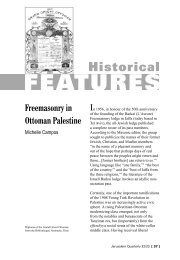
![In Search of Jerusalem Airport [pdf] - Jerusalem Quarterly](https://img.yumpu.com/49007736/1/180x260/in-search-of-jerusalem-airport-pdf-jerusalem-quarterly.jpg?quality=85)

